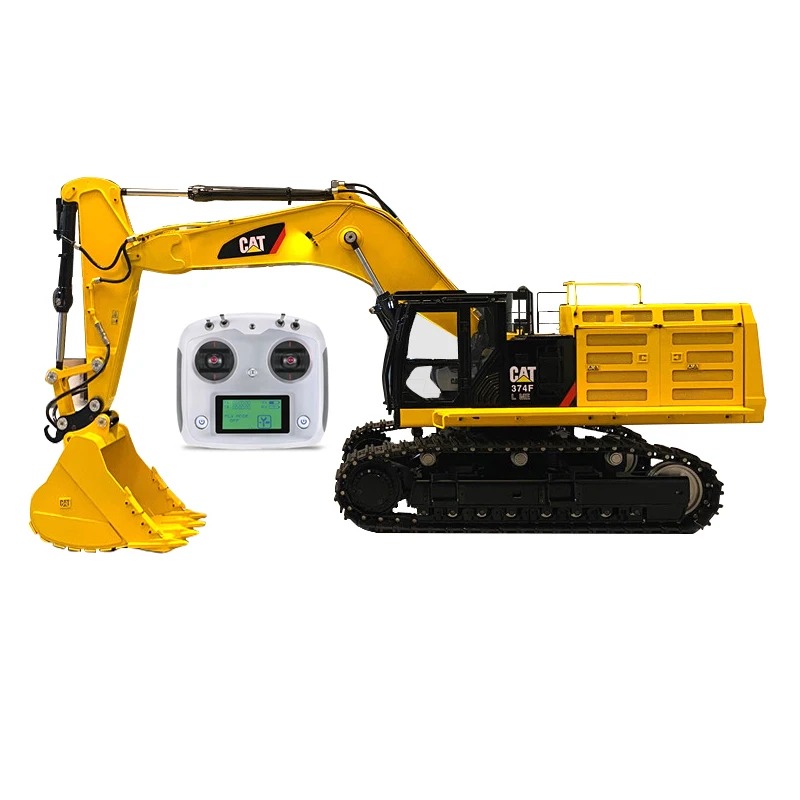Recognizing How Excavator Works and Its Effect On Performance
Excavators play a necessary role in building and mining operations, counting on a complex interaction of mechanical and hydraulic systems. Their capability to carry out a variety of jobs hinges on both their design and the modern technology incorporated within. Comprehending these parts can significantly impact operational effectiveness and productivity. As advancements remain to improve the industry, one should take into consideration exactly how these changes will certainly affect future practices and efficiency.
The Fundamentals of Excavator Mechanics

The Duty of Hydraulic Equipments in Excavators
At the heart of excavator operation exists the hydraulic system, which plays an essential duty in powering the device's features and activities. This system makes use of pressurized hydraulic fluid to transfer energy, enabling numerous activities such as moving, training, and digging. By taking advantage of the principles of hydraulics, excavators can execute tasks with impressive accuracy and force, improving total functional efficiency.The hydraulic system is composed of vital elements, including pumps, cylinders, and valves, which collaborate to control the circulation and direction of the liquid. When the driver involves the controls, the hydraulic fluid is directed to details cylinders, converting the operator's commands into physical movement. This system allows for responsive and smooth activities, which are essential in building and construction and excavation atmospheres. double e volvo rc excavator. The performance of the hydraulic system straight affects the performance and versatility of the excavator, making it an important aspect in modern-day excavation processes
Secret Parts of an Excavator
Recognizing the crucial parts of an excavator is essential for grasping how this effective device runs. An excavator includes a number of significant components, including the undercarriage, home, pail, boom, and arm. The undercarriage provides security and movement, usually including tracks or wheels to navigate various terrains. Your home consists of the engine and hydraulic systems, enabling the driver to manage activity and power the machine. The boom extends from your house, enabling vertical reach, while the arm attaches to the bucket, helping with excavating and lifting operations.Additionally, the taxi houses the driver, geared up with controls for exact handling. Each of these components plays a crucial role in the excavator's overall functionality, contributing to its efficiency and effectiveness on construction sites. Recognizing these parts assists in maximizing and preserving excavator efficiency, making sure tasks are finished securely and efficiently.
Attachment Adaptability and Its Advantages
Add-on versatility is an essential aspect of excavators, enabling operators to change in between numerous tools tailored for certain tasks. This adaptability not just boosts work effectiveness but likewise contributes to cost-effectiveness by lowering the demand for numerous machines. Comprehending the different kinds of add-ons available can greatly affect the overall performance and capability of an excavator on work websites.
Kinds of Accessories
While excavators are mostly identified for their excavating abilities, their real versatility depends on the wide array of accessories readily available. These accessories boost the excavator's performance, allowing it to carry out various tasks beyond excavation. Typical accessories include buckets (for digging and scooping), hydraulic thumbs (for realizing materials), and augers (for drilling openings) Grapples are utilized for managing and relocating debris, while rippers can damage up tough surfaces. Various other specialized add-ons, such as plates and plows, allow excavators to adjust to particular work demands. This diversity not just enhances the maker's energy across various fields, consisting of demolition, construction, and landscape design, however also enables drivers to customize their tools to meet particular job needs efficiently.
Increased Job Efficiency
Making best use of task performance is a primary benefit of making use of different excavator accessories. Various attachments allow an excavator to carry out several tasks without requiring to switch tools, conserving important time and labor. As an example, using a hydraulic hammer can damage concrete while a container accessory can excavate soil, enabling a smooth workflow. This convenience lowers downtime connected with devices modifications and boosts productivity on-site. In addition, specialized attachments enhance precision in jobs such as grading or landscaping, leading to better results. The ability to adjust to various task demands not only improves procedures but also decreases the demand for added machinery, ensuring that tasks are completed swiftly and effectively. Overall, accessory convenience considerably adds to increased job performance in excavation job.
Cost-Effectiveness and Adaptability
Cost-effectiveness is a substantial advantage of using functional excavator accessories. These accessories permit a solitary excavator to perform numerous tasks, lowering the requirement for additional equipment and labor - double e volvo rc excavator. By switching in between pails, hammers, and grapples, operators can deal with various projects, from digging to demolition, consequently making the most of devices usage. This flexibility not just decreases operational costs but also decreases downtime associated with changing devices. Additionally, the capability to customize excavators with specialized add-ons boosts productivity, as they can efficiently handle varied tasks according to job needs. To end, the mix of cost-effectiveness and versatility in excavator add-ons adds to boosted functional efficiency and source allotment in building and construction and excavation tasks

Advanced Modern Technology in Modern Excavators
Modern excavators are progressively equipped with innovative innovation that changes excavation processes. Automation improves operations, while enhanced fuel performance decreases functional costs. In addition, smart control systems enhance precision and security, noting a considerable advancement in excavation tools.
Automation in Excavation Processes
As excavation technology progresses, automation has actually emerged as a vital element in improving efficiency and accuracy on job sites. Modern excavators are outfitted with advanced automated systems that help with jobs such as grading, excavating, and trenching with very little driver intervention. These systems utilize sensing units, GPS, and artificial intelligence algorithms to ensure precise positioning and depth control, substantially reducing the margin for error. Additionally, automation allows operators to focus on calculated decision-making instead of manual controls, resulting in enhanced performance in general. Such developments not just streamline operations however also improve security by minimizing human mistake in complicated procedures. The assimilation of automation in excavation procedures stands for a significant advancement in building innovation, driving the market towards better performance and efficiency.
Enhanced Fuel Effectiveness
Developments in modern technology have also brought about considerable improvements in fuel effectiveness for modern excavators. Modern devices are outfitted with sophisticated engines that maximize power output while minimizing fuel consumption. These engines utilize ingenious combustion technologies, such as turbocharging and direct fuel injection, to enhance efficiency and efficiency. Additionally, lightweight materials in construction lower general weight, enabling for less power expense throughout procedure. The introduction of variable rate controls allows operators to change engine performance according to details jobs, better minimizing fuel use. Therefore, these improvements not only lower functional costs but likewise add to ecological sustainability by reducing discharges. In general, boosted gas effectiveness in excavators is a vital development that reinforces performance and financial practicality in the building industry.
Smart Control Solution
While operators browse increasingly complicated job websites, clever control systems in excavators have actually become crucial devices for boosting performance and precision. These innovative innovations utilize sensing units and formulas to monitor different specifications such as load weight, get more terrain conditions, and operational efficiency. By instantly adjusting hydraulic functions, wise systems enhance device efficiency, causing boosted productivity and minimized endure components. Additionally, operators gain from instinctive interfaces that give real-time feedback and diagnostics, permitting informed decision-making. This integration of technology not just simplifies procedures yet also lessens human mistake, contributing to much safer job atmospheres. As the click this site building market proceeds to evolve, wise control systems will certainly play a vital role fit the future of excavator effectiveness and efficiency.
Enhancing Functional Performance With Excavators
Excavators play an important function in enhancing operational efficiency throughout numerous building and excavation jobs. Their adaptability permits numerous tasks, consisting of digging, training, and product handling, which improves operations and decreases the demand for added tools. With powerful hydraulic systems, excavators can carry out heavy-duty tasks with accuracy, substantially decreasing the moment required to full tasks. The assimilation of sophisticated technology, such as GPS and automated controls, further enhances their procedure, enabling operators to accomplish better precision and minimize product waste. In addition, modern excavators are designed to eat much less fuel and decrease discharges, contributing to both expense financial savings and environmental sustainability. By using excavators efficiently, building and construction groups can boost productivity, meet job target dates, and improve overall site management. This multifunctionality and performance make excavators indispensable devices in the modern-day building and construction landscape.
The Future of Excavators in Construction and Mining Industries
As the construction and mining markets develop, the future of excavators is poised for significant change driven by technological innovation and altering functional demands. Breakthroughs in automation and expert system are improving excavator capabilities, enabling for improved precision and performance in operations. Autonomous excavators are arising, decreasing the demand for human intervention and minimizing the risk of accidents.Moreover, the assimilation of telematics and IoT technology makes it possible for real-time tracking of equipment performance and predictive upkeep, enhancing uptime. Eco-friendly layouts, including hybrid and electric designs, are gaining traction, aligning with sustainability goals within the industry.Additionally, the usage of innovative products and lighter styles boosts fuel effectiveness while preserving performance criteria. As these patterns progress, excavators will certainly play a vital function in fulfilling the raising demands for performance and safety in building and construction and mining, inevitably transforming operational landscapes.
Frequently Asked Concerns
How Do Weather Affect Excavator Performance?

Weather considerably influence excavator efficiency, as rain and mud can impede grip and stability, while extreme temperatures may influence hydraulic systems. Operators must adjust to these variables to assure suitable functionality and security during operations.
What Precaution Should Operators Comply With While Utilizing Excavators?
Precaution for excavator operators include wearing appropriate individual protective devices, conducting pre-operation inspections, making certain proper communication with ground workers, maintaining a risk-free range from above hazards, and adhering to well-known operational protocols to avoid mishaps.
How Usually Should Excavators Be Maintained for Optimal Performance?
Excavators need to be preserved regularly to ensure peak efficiency, commonly every 250 operating hours or as specified by the producer. Regular checks enhance dependability, stop unexpected breakdowns, and prolong the life-span of the devices.
What Is the Ordinary Life-span of an Excavator?
The ordinary life-span of an excavator usually ranges from 10,000 to 15,000 hours of operation. Aspects influencing long life consist of upkeep practices, running conditions, and the high quality of the equipment itself, affecting overall performance and effectiveness.

Can Excavators Operate on Uneven Surface Efficiently?
Excavators can operate efficiently on uneven surface as a result of their articulated layouts and adjustable tracks. These attributes permit them to maintain stability and grip, making it possible click for more info for reliable procedure in challenging atmospheres commonly encountered in building and construction and landscaping projects. Each of these components plays a vital duty in the excavator's total performance, adding to its performance and effectiveness on building websites. Taking full advantage of task efficiency is a primary advantage of using various excavator add-ons. While drivers navigate increasingly complicated task sites, smart control systems in excavators have arised as crucial devices for improving efficiency and precision. Excavators play a crucial duty in enhancing operational effectiveness throughout numerous building and excavation jobs. Advances in automation and man-made knowledge are reshaping excavator abilities, permitting for improved precision and performance in procedures.